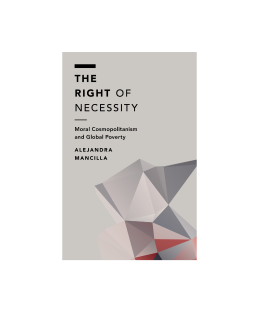
Additional Information
Book Details
Abstract
Does recognition of the basic human right to subsistence imply that the needy are morally permitted to take and use other people’s property to get out of their plight? Should we respect the exercise of this right of necessity in a variety of scenarios – from street pickpocketing and petty theft to illegal squatting and encamping?
In this concise and accessible book, Alejandra Mancilla addresses these complex and controversial moral questions. The book presents a historical account of the concept of the right of necessity—from the medieval writings of Christian canonists and theologians to seventeenth century natural law theory. The author then goes on to ground this right in a minimal conception of basic human rights, and proposes some necessary and jointly sufficient conditions for its exercise. She confronts the main objections that may be posed against this principle and ultimately concludes that the exercise of this right should be considered as a trigger to secure a minimum threshold of welfare provisions for everyone, everywhere.
The Right of Necessity is philosophical argument at its best: direct, challenging, clearly written, and focused on an issue of utmost importance. Mancilla revives a traditional ethical view and shows its relevance to the world today. Future discussions about an ethical response to global poverty will need to take account of The Right of Necessity.
Peter Singer, Ira W. DeCamp Professor of Bioethics, Princeton University and author of The Life You Can Save
In contexts where unjust structures perpetuate deprivation or those who have responsibilities to assist fail to do so, what may those in need do to satisfy their basic right to subsistence? In this impressive work Alejandra Mancilla explores this question of high contemporary relevance and provides a welcome contribution to current debates on global justice.
Gillian Brock, Professor of Philosophy at the University of Auckland, New Zealand
Alejandra Mancilla is a postdoctoral researcher at the Centre for the Study of Mind in Nature (CSMN), University of Oslo, Norway. She is the co-editor of Theories of Justice (2012), and her articles have appeared, among others, in the Journal of Political Philosophy, Res Publica, the Journal of Applied Philosophy, and the Critical Review of International Social and Political Philosophy.
This text aims to prove the existence of one basic right – a right of necessity – derivable both from our understanding of natural rights and from prevailing theories of property rights. The right has the direct implications of permitting the taking and using of others’ property for survival. And it can be treated as an anchoring-point for cosmopolitan political theory and theories of global justice. The argument is persuasive ad the text itself is a model of methodological and argumentative economy. The book will be o interest to those working on human rights, cosmopolitanism, global justice and political theory.
A valuable and thought-provoking book.
This is a theoretically sophisticated and conceptually innovative book which posits a cosmopolitan right of necessity and explores what responses are permissibly available to the poor in forcing change to unjust structures of poverty. This is a truly groundbreaking book that will no doubt arouse cosmopolitan reflection and debate about one of the most pressing issues facing the human condition.
Garrett Wallace Brown, Reader in Political Theory, Global Ethics and Global Health Policy, University of Sheffield
[...] an engaging book which brings a very worthwhile idea with real world implications to a debate of utmost urgency. […] The book delivers a very clearly argued case for a right that has been neglected for too long, a right that should be high on the agenda for all moral cosmopolitans. Highly recommended.
Table of Contents
| Section Title | Page | Action | Price |
|---|---|---|---|
| Contents | 11 | ||
| Acknowledgements | 13 | ||
| Chapter One: Reviving the Right of Necessity | 15 | ||
| Part I: Historical Accounts of the Right of Necessity | 37 | ||
| Chapter Two: The Right of Necessity as a Retreat to the Right of Common Use | 39 | ||
| Chapter Three: The Right of Necessity and the Pull of Self-Preservation | 59 | ||
| Part II: The Right of Necessity and Global Poverty | 77 | ||
| Chapter Four: Justifying the Right of Necessity | 79 | ||
| Chapter Five: Content, Form and Conditions | 95 | ||
| Chapter Six: The Overdemandingness Objection | 111 | ||
| Chapter Seven: The Right of Necessity within Moral Cosmopolitanism | 125 | ||
| Bibliography | 131 | ||
| Index | 137 |
